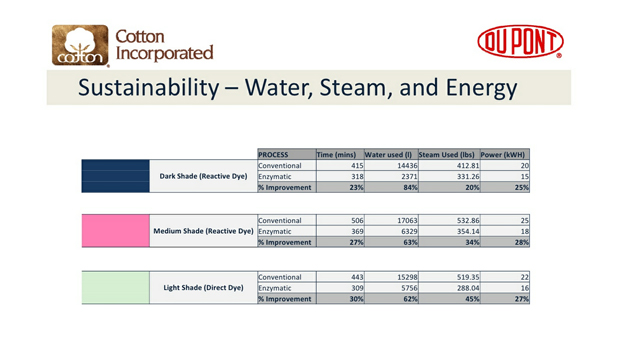
US knitters band together to fight COVID-19
Speaking at the ‘Great Ideas in Cotton’ conference in Hong Kong recently, Cotton Incorporated and DuPont Industrial Biosciences presented the results of a collaborative project quantifying the effectiveness of bio based enzymes as an alternative to traditional chemicals in cotton textiles preparation.

28th May 2012
Knitting Industry
|
Hong Kong
Speaking at the ‘Great Ideas in Cotton’ conference in Hong Kong recently, Cotton Incorporated and DuPont Industrial Biosciences presented the results of a collaborative project quantifying the effectiveness of bio based enzymes as an alternative to traditional chemicals in cotton textiles preparation.
The trials, which focused on ways to integrate and bio-optimize textile processing in knits, are said to have shown that bio based enzymes used in combination can eliminate the need for caustic chemicals, while dramatically reducing water and energy use, as well as overall processing time.

"Bio-enzymes, such as our PrimaGreen products, have for some time offered a sustainable alternative to chemicals typically used in textile preparation," said Nico van Schoot, Marketing Manager, DuPont Industrial Biosciences.
"As these trial results illustrate, bio-enzymes also can provide practical business advantages in terms of processing time and associated costs."
Mary Ankeny, Director of Dyeing Research at Cotton Incorporated, supervised the trials.
"We knew that bio-enzymes were effective at each individual stage of cotton textile preparation but we wanted to see if combining enzymes for scouring, bleaching and dyeing also could consolidate some steps in the process without sacrificing quality," Ms Ankeny said.
The results are said to illustrate an average reduction of 70% water (by litre); 33% steam (in pounds); and 27% in energy (as kWH) across dark, medium and light shade ranges.
By better utilizing water, steam and energy, the bio-optimized process is said to reduce the total costs of these inputs by an average of 66%. The parties claim that the process also reduces process time by 23% for dark shades, 27% for medium shades, and 30% for light shades.
"Water use has always been a challenge for textile wet processing," Ankeny said. "It is a key concern in the industry today. The bio-enzyme combination significantly reduces the water volume by enabling the same water bath to be used for multiple process steps."
The energy savings of the optimized process are said to be due in large part to the DuPont bio-enzymes, which allow textile preparation to occur at much lower temperatures.
"The enzymes are also derived from natural resources and are biodegradable," said van Schoot.
Cotton knits produced within the trials showed are also said to have good whiteness values, mote removal, maintenance of fabric strength and weight, and were receptive to dark, medium, and light dye shades.
"The collaborative enzymatic trials with Cotton Incorporated will provide DuPont bio-enzyme customers with a viable and sustainable method of reducing their environmental impact and optimizing their production efficiencies," said van Schoot.

Business intelligence for the fibre, textiles and apparel industries: technologies, innovations, markets, investments, trade policy, sourcing, strategy...
Find out more